| Reviews & Columns |
|
Reviews DVD TV on DVD Blu-ray 4K UHD International DVDs In Theaters Reviews by Studio Video Games Features Collector Series DVDs Easter Egg Database Interviews DVD Talk Radio Feature Articles Columns Anime Talk DVD Savant Horror DVDs The M.O.D. Squad Art House HD Talk Silent DVD
|
DVD Talk Forum |
|
|
| Resources |
|
DVD Price Search Customer Service #'s RCE Info Links |
|
Columns
|
|
|
Sunset Boulevard - The Centennial Collection
Paramount // Unrated // November 11, 2008
List Price: $24.99 [Buy now and save at Amazon]
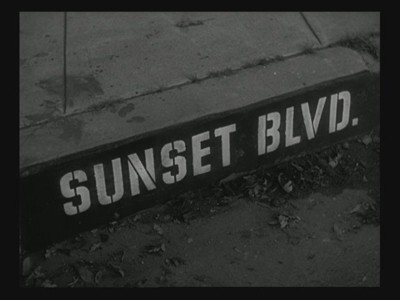
"You are... writing words, words, more words! Well, you'll make a rope of words and strangle this business! But there'll be a microphone there to catch the last gurgles, and Technicolor to photograph the red, swollen tongues!"
-- Norma Desmond, Sunset Boulevard
Sunset Boulevard: An Essay
Though she claims to be a radiant "star" throughout Billy Wilder's eccentric film noir, Sunset Boulevard, legendary femme fatale Norma Desmond parallels more with two other majestic entities: Hollywood, and a celestial black hole. She, like each, tends to draw quite a few characters towards her "beaming" presence, and then engulfs those surrounding her with implosive vigor. Billy Wilder, the deviant director with a keen eye for interpersonal deconstruction and brooding mystery, matches Norma's gravitation with perceptive characters that appear to be consumed by both her and the film industry. Consumption of characters, both strong and weak, virgin and jaded, are the essence of Sunset Boulevard's enduring, unquenchable resonance -- and the key to cinema's most biting and involving film about Hollywood's dizzying grasp on immortality.
Watching Joe Gillis fall prey to the whims of both the shark tank of Hollywood screenwriting and Norma Desmond's omnipresence can provide all the enjoyment needed for a compelling character mystery about Hollywood's corruption. First, Joe (William Holden) falls prey to the cutthroat world of marketable films and the soup du jour, or flavor of the week, mentality. One day, he tosses out scripts left and right with great success, while the next he is buried to such a degree that he scrounges for a measly three-hundred dollars to keep his car from being impounded. All this comes to his doorstep just so that he can stick around Hollywood in hopes of making it big again. He mentions his availability to take a steady job that pays thirty-five dollars a week back home in Ohio, but he knows that position will not satisfy him in the ways that inking a Hollywood production will. Once he brings his new work back to Hollywood, also known as a host of indiscernible faces he claims to be friends with, the industry tries to manipulate his proposed ideas into something more marketable for the time. The only way for Joe to sell his writing, case in point a dramatic piece about baseball, is to dress it up as lighter fare with women and music. Though, even with this kind of irrevocable disconcert, he still scrambles around wildly to a rolling stop in his car onto Sunset Blvd. looking for the money to continue such a life.
Once Norma Desmond (Gloria Swanson) gets her fingers around Joe Gillis, however, we're reminded of how enveloping and contorted Hollywood and its other-worldly children can be. For just a dash of money to save his car and the opportunity to wedge into Hollywood again, Joe gives in to personal reservations about a bizarre situation and agrees to aid a fallen silent film star in her script reconstruction. Quickly, he sees that this job opportunity comes with consequences. In his older clothes, Joe looks like a fish freshly sprung from the water. However, underneath the roof of Norma's shrine-like mansion, Joe would quickly become outfitted in the industry issue regalia of sharp suits and glistening ornaments. William Holden's demeanor changes once these new clothes encompass his frame, one of security and belonging that becomes the true paradigm in Sunset Boulevard. As he slopes into this comfort zone, he seems to fall into Norma's black hole presence much like being pulled into Hollywood's magnetic aura.
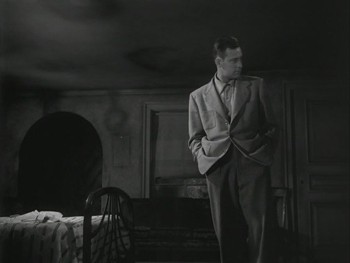 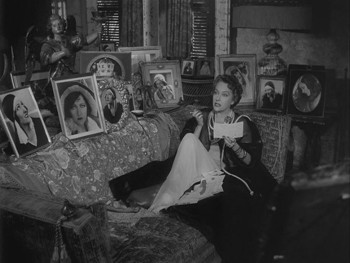 |
Tangible Hollywood, in Wilder's sly critical eye along the same lines as his fervor for media in Ace in the Hole, would draw Gillis away from this lush lifestyle. Controlled and able to create, Joe Gillis starts to get the itch to write once again as he grows comfortable in his newly replenished skin. He takes it upon himself to venture out towards Paramount Studios to work with script reader Betty on a new story. His chronic draw towards cinematic inspiration would, ultimately, entail his collapse. Leaving Norma's mansion to work on another project with a different woman would be endangering the well-being of both him and Miss Desmond. This is a risk he's willing to take, as he inherently gravitates towards Hollywood. His full return, alongside his relationship with Betty, would lead to the climactic scene that would bring about Joe's final moments of clarity. Only once he is completely separate from Hollywood, namely Norma and Betty, do his statements rear a pristine air about them. One of his final lines in Sunset Boulevard involves his conclusive words to Norma that show his unabashed revelation. When Joe reveals that there is "nothing wrong with being 50, unless you're trying to be 25" to Norma, it shows that he now believes honesty and openness are the core ideals that guide someone safely through life. Of course, he realizes this even though it ultimately leads to his eternal dip into that pool he always desired.
It might not do any good for Max von Mayerling (Eric von Stroheim), Norma's butler, to learn this lesson of dishonest reinforcement. As a famed silent film director during Norma's heyday, Max was acclimated to controlling actors, lighting, and aesthetic elements within his films. Though he claims love for Norma and has voluntarily lowered himself to her butler after years of working together and, oddly, a marriage, there's also a sense of obligation he seems to act out as the servant underneath her feet. Max seems to find little bits of narcissistic joy in his reminders of Norma's success, as if to reminisce on his achievement of creating a star. He still feels bound to Norma, however, clearly shown by the way he wears his butler's outfit in the home and intuitively does her bidding. Even in this state, Max still finds ways to direct in Norma's life, as if ingrained through the clockwork of Hollywood's machine. He controls lighting, shown as when he moves the lamp closer to Joe as he reads at the start in Norma's parlor. Max also makes comments on Norma's make-up as she approaches Paramount Studios, claiming she needs to doctor her eye shadow to keep a balance on her face.
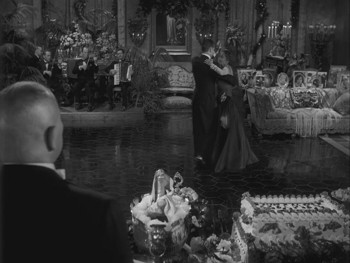 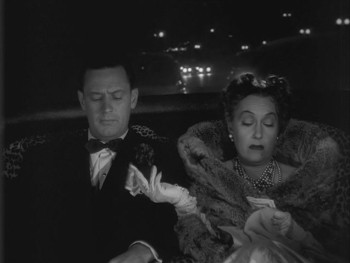 |
Aesthetic points and control -- a key slate of critiques underneath Sunset Boulevard's eye -- become the focal point of a director, and become necessary evils that cannot be vanquished after Max's many years of control. Outside of his director's chair and after the fall of his silent film star, he appears to only find contentment in living the antithetic life underneath her buzzing control amid tinkering with minute tangibles. However, Max has vanquished almost complete control over to Norma, including all his actions, for all important elements in her life. When Joe inquires about Max's planning of the New Year's party, Max relays that he "doesn't know", followed by a "sir", and that "[m]adam made the arrangements". Famous directors expect these pleasantries from his crew, not for them to issue out. He even goes so far as to pick up freshly dropped items for Norma; during the dancing ballroom scene, when the veil begins to tickle Joe's face, Norma tosses it onto the Valentin-inspired tile in a prime spot for a cut of Max reaching down to pluck it from the shimmering surface.
At his most clear and explicative moment, seen as the great "turn" in Wilder's brooding tour de force, Max stands with Joe underneath the moonlight in the garage and gives explanation as to his concise care for Norma. Once Max reveals that he's responsible for Norma's stardom, profound understanding of the film's foreshadowing ushers into Sunset Boulevard. He, in a sense, feels responsible for her depleting sanity, and feels that he's the only individual with enough clout to care for her in her frail state. He owes it to her for making her fans both love and, now, ignore her presence in the film industry. Max maintains the illusion by writing her false fan letters and, in her final hour, acting as her controlling directorial hand once she gently steps down the staircase into police custody for Joe's murder. He understands the film industry's draw, clearly shown by his utilization of it to lure Norma down the stairs. Both Hollywood and, in a sense, Norma gave Max the power to be a director; he infused star power into Norma through his films, and then tries to vanquish his conscience by paying her back with limitless service once her career has ceased.
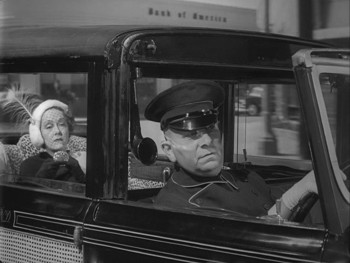 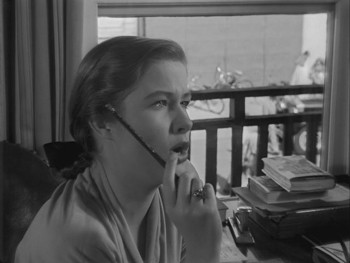 |
Though she's a smaller player in the grand scheme of things, the young script reader Betty Schaefer (Nancy Olson) also gets sucked into the lure of Hollywood's whims -- just like Joe and Max. Having grown up on the set with her family of production assistants, she's become privy to the ways of Hollywood as a developing script reader. However, like all proud parents, they wished for more regarding Betty. Early on, the gleam of Hollywood drove Betty to alter herself in betterment for the camera. Ironically, it cost the same amount to fix her unappealing nose that it does to rescue Joe's car from his impounders' stranglehold. That figure marks the pettiness and scraping of the barrel that Hollywood is about, because neither Joe nor Betty were successful in hurdling past that three-hundred dollar mark. Betty, instead, was able to get this money just to fix her nose; however, once she did so, Hollywood then decided to be honest and explain that her talents were the problem in the first place. Once she found her place as a reader, it's odd to see her honest talents walled off in a corner while the major exec at the beginning of the film, filled with manipulative and unoriginal ideas, has the lush office. After ten years of preparation and a stiff monetary sacrifice for a young girl, she still hasn't fully integrated into Hollywood at the end.
Unreturned and irreparable investment is the key factor across the board in Sunset Boulevard. Each character devoted themselves heftily into the industry in hopes for stardom and limelight, only to try and retrieve the glimmers of poignancy from yesteryear in desperation. Oddly enough, their deconstruction occurs amidst one of the lucky actresses that succeeded to great lengths. Norma, the embodiment of Hollywood, snatches life away from all three of these characters; Max's career fizzles with her sanity, Betty's acting skill seems inadequate to the quality portrayals of Norma's majesty of the past, and Joe literally bites the big one at the end of the film. Like Hollywood, she endures past all the chaos that she, in herself, creates. Sunset Boulevard, fully obsessed with the murky and tainting resonance of Hollywood's splendor, inclines viewers to think twice even now about the draw of its sparkling demeanor.
The DVD:
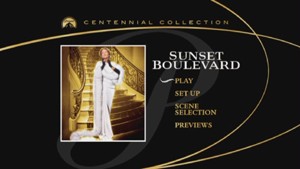 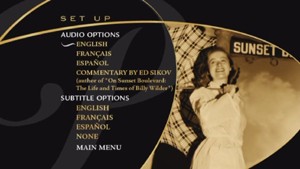 |
In connection with the approach to Paramount's 100th Anniversary, the studio has commissioned a "Centennial Collection" of spine-numbered, lavish editions of some of its classics. Kicking off this collection, in Spine #1's spot, is this fantastic presentation of Sunset Boulevard. Housed in a dazzlingly attractive, heavy duty cardboard slipcover with embossed and raised elements on both front and back, it's quite an attractive package. When opened, we're treated to a shiny two-disc keepcase -- with hubs on each side that hold the discs. However, in a applause-worthy turn from Paramount, they've decided to include a slick eight-page booklet featuring sizable still shots and assorted, non-sourced textual information about shooting locations, Academy Award prestige, and other elements.
The Video:
Paramount's original 1.33:1 transfer for Sunset Boulevard from the Special Collector's Edition is/was quite a stunner, displaying a highly-competent level of dust and debris removal, sublime concentration on detail, as well as a level-headed embodiment of the black-and-white shade ranges. Since this effort is such a success, Paramount decided to keep it largely the same for this Centennial Collection -- only with a few tweaks in the refinement department. In many, many shots, you'll be able to see little-to-no difference in the image, such as against Norma's face during her "pictures that have gotten small" segment, against close-ups on Betty's face during her conversation with Joe Gillis on the set at Paramount, and following the camera as we first enter Joe Gillis' apartment -- minor speckles and hair damage on the right side of the frame still intact.
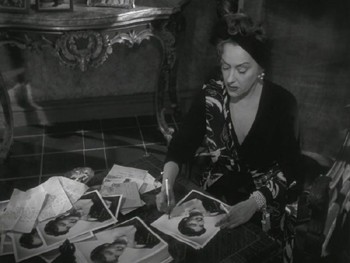 Click for Larger Image | 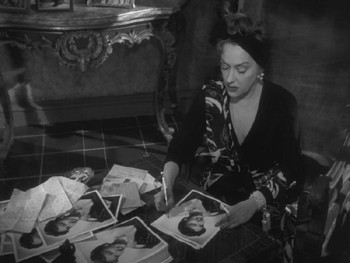 Click for Larger Image |
In other scenes, however, there are a few noticeable -- and welcome -- tweaks. Mild emphasis can be placed on the distinct level of compression artifacts, which looks marginally better in this new visual presentation. As with the digital properties, which render an even-more realistic image, black levels have been improved as well to reveal more in the shadows that present in the older edition. One significant point to notice is a focus on removing a tinge from the image, such as in the scene with Norma signing an army of self-portraits for her "adoring fans" along with many others. It's a mild shift that stretches in degrees across much of the film, but this series of adjustments creates a holistically more consistent image that stays latched onto a proper grayscale rendering. Also, it's worth noting that the image has been opened up on the sides to reveal more of the film, but with that comes a difficult element to pinpoint: a slight gray glow comes from the left side across many points of the film -- something probably inherent with the negative, which does more to enhance the presentation than it does to detract. Paramount did a bang-up job with the visual treatment on their Special Collector's Edition of Sunset Boulevard, which echoes splendidly onto this refined image.
The Audio:
In fact, that entire scene with Joe sitting at the typewriter and Norma lurking in her day chair, followed by the pan shot of her many photographs, works as a great comparison point for the Dolby 2.0 Stereo / Mono track as well. It encompasses points of narration, dialogue, competence with blending words and sound effects (Norma thrusting paper forward while speaking), and score balance. After watching this scene several times following my full screening of this new Centennial Collection print, there's a few nice boosts in clarity. It seems to be a brighter audio presentation, embodying a higher competence on higher and mid-range levels than the original track.
By comparison, the 2002 Special Collector's Edition sounds mildly wooden and hollow, with a weaker pitch competence, while this new Centennial Collection sounds much more rich and vibrant. Both Norma's alto-based shrill voice and Joe's mid-baritone vocal qualities don't sound like they're pushing the envelop too hard, which creates a soundstage filled with a much more pleasing range. Joe's narration also sounds a bit more resonant and booming, something that the original disc didn't suffer from too much but, when looking in retrospect, could've used a hint of enhancement. Furthermore, the balance between narration and the splendid Franz Waxman score hit a striking equilibrium that leaves both highly audible without fighting for attention. English, French, and Spanish language tracks are also available, along with subtitles for each of the aforementioned languages.
The Extras:
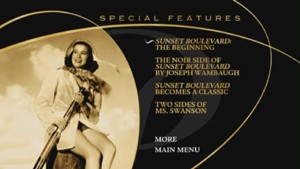 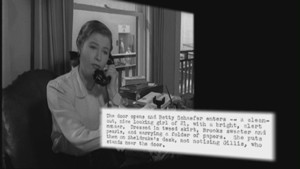 |
Commentary with Ed Sikov, Author of "On Sunset Boulevard" (From 2002 CE):
Ed Sikov delivers a great, highly factual commentary track with a broad assortment of analytical elements regarding the film. He talks about symbolism -- more intriguingly about rain near the core of the story -- as well as many of the fact-based tidbits that many have come to know over the years, such as the fact that Gloria Swanson and Eric von Stroheim worked together as actress / director on the film shown during the living room movie scene. He's an intelligent, eloquent speaker that undoubtedly flexes his knowledge on the stuff with only marginal breaks within the material.
On Disc 2:
Sunset Boulevard: The Beginning (22:46):
Paramount comes out swinging with their initial featurette, a somewhat general assembly piece that focuses on Billy Wilder, his cast, and the relationship that they built with the studio as Sunset Boulevard started on its creative pathway. The Beginning's layout mirrors other pieces of its kind -- alternating between cast and crew interview footage and behind-the-scenes shots -- but the way that it's conducted is splendid. Nancy Olson speaks to great lengths about her experience with the picture, while other Paramount execs and film historians delve into Wilder's signature eye and its process of developing the film from casting choices to his usage of legendary costume designer Edith Head.
The Noir Side of Sunset Boulevard (14:19):
Sunset Boulevard's pathway as one of the more unusually constructed -- and most evocatively conducted -- film noirs of the period is chronicled and analyzed by ex-LAPD detective and author Joseph Wambaugh here. It goes into depth at dissecting Norma Desmond as a femme fatale, Wilder's gothic whimsy with its structure, and a wealth of symbolism within the film that revolves around decay and draw to Norma's existence. It also connects the genre's typical lack of emotion with Sunset's immense resonance.
Sunset Boulevard Becomes a Classic (14:28):
Critics, historians, and filmmakers address the classic nature of Sunset Boulevard, including interview footage from Gloria Swanson as she reflects on her reminiscence of her first screening of the film -- and its bizarre reception. It talks about actor reception to Norma's plight, dissection of its elements, and initial critical outlook on its initial release. There's also a lot of focus on its status against All About Eve, the film that won the Academy Award over Sunset Boulevard that year. It's biggest play is Nancy Olson's introduction of the idea that each character in the film as "opportunists", along with great interview footage featuring Glenn Close who played Norma Desmond in the theater.
Two Sides of Ms. Swanson (10:37):
Starting off with interview footage of Gloria Swanson's granddaughter, this featurette takes a wealth of insight in illustrating her more domestic properties. It takes a deep personal insight into her character, from her health food interests to her concentration on fashion and artistry. There's also a lot of focus on her manners and pure, controlled nature both on and off set.
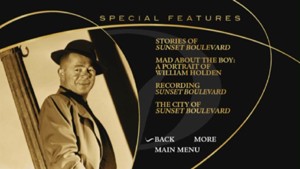 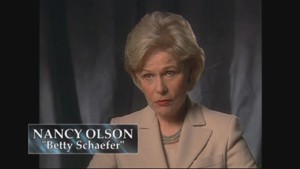 |
Stories of Sunset Boulevard (11:22):
Recurring guest film critics and crew comment further on some assorted stories about the film, from the initial possibility of using the "toe tag" scene in early screenings to Nancy Olson's initial determination for her first scene in the film. It zeroes back in on Wilder and his style / directive methods, along with his sarcasm and self consciousness. There's a particularly great story involving Olson, Billy Wilder, William Holden -- and his wife Ardis (Brenda Marshall) during a rehearsal of the balcony scene. But the best part is the quote from Gloria Swanson at the end of the piece about her affection for the shoot.
Recording Sunset Boulevard (5:51):
Franz Waxman's work on Sunset Boulevard's Academy-award winning score grabs the attention in this featurette, covering interview footage from critic Andrew Sarris and soundtrack producer Robert Townson as they discuss the music from the film. There's plenty of discussion on the re-recording of Sunset Boulevard's score during a reinvigoration of the music for a new soundtrack recording, along with the music that plays during "Conversing Corpses" -- the nine-minute cue that never made it into the film.
Mad About the Boy: A Portrait of William Holden (11:13):
Fond interview footage recalls the actor that plays Joe Gillis, especially some interesting dynamic description from Nancy Olson that shows their special brand of intimacy that often develops between actors. It also shows Holden's companion Stephanie Powers and their connection as somewhat worldly individuals. There's a lot of focus on Holden embodying an "everyman", as well as an off-kilter dark presence in film. But it also begins to concentrate on his later years, also entailing his efforts in wildlife conversation.
The City of Sunset Boulevard (5:36):
Identifiable Hollywood locations takes center stage here, but in an interesting light. L.A attractions author Borislov Stanic and Sunset Boulevard expert Ed Sikov identify different locations that Wilder used for the film, along with other films that have used the same locations. It tells the history of each location, as well as how the locations were manipulated to accommodate to the needs for the film. The most intriguing parallel is the differences in filming on location at the famous mansion and its interior shots -- and how they never connected.
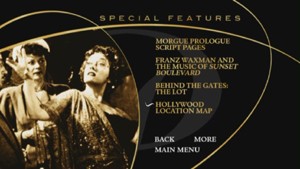 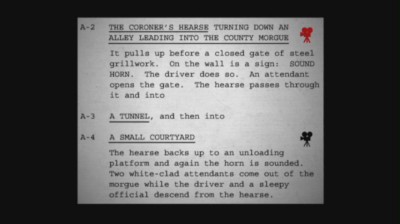 |
Morgue Prologue Script Pages (2002 CE):
Two options are available for this extremely novel and noteworthy special featurette -- one for the Original Morgue Prologue, and the other for the "Revised" Morgue Prologue. Script pages are accessible for viewing for each version, while a small video camera becomes available to reveal the cluster of "original, uncut shot (s)" available to watch. It's great to see Wilder's more comical style at play in the Sunset Boulevard universe, while also displaying his conscientiousness for the project by removing the scene from the film.
Behind the Gates: The Lot (5:06):
A.C. Lyles recounts Paramount's process through the changes in cinema, from the silent era to the integration of color. It's a concentrated five-minute history on Paramount, in all its previously segmented glory, along with the ideas of traveling outside of the studio to shoot its pictures.
Franz Waxman and the Music of Sunset Boulevard (14:28) (2002 CE):
John Waxman, son to Franz, illustrates his father's passion for music as his career. There's plenty of discussion about the musical hierarchy on the film (i.e. who reports to who), as well as the overall process of creating the "feel" for a score and how they approached that process. It discusses the process of "spotting" the score, cue sheet arrival, along with the participation that Wilder implied on the score.
Hollywood Location Map (2002 CE):
A small interactive map illustrates the different locations of Sunset Boulevard, showing the locations for the film. It reminds me a lot of WB's L.A. Confidential interactive map, but there's actually a wealth of insightful narrative information to accompany the short montage shots from each locale.
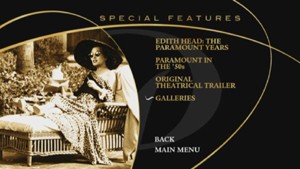 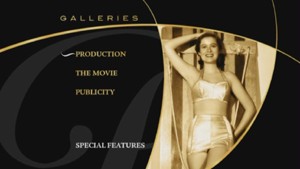 |
Edith Head: The Paramount Years (13:43) (2002 CE):
Known in many circles as one of the most renowned costume and aesthetics designers in film, Edith Head falls under the spotlight with the holistic historical portrait. It follows her history, along with her participation on Paramount's projects from Roman Holiday to The Greatest Show On Earth. Biographer David Chierichietti chronicles her history.
Paramount in the '50s (9:37):
Paramount includes a neat ten-minute featurette that cranks down some of its bigger classics, from White Christmas to Ten Commandments and Funny Face -- along with Sunset Boulevard. Noteworthy to Sunset Boulevard fans will be the pieces of footage that show Sunset Boulevard before undergoing its polish for the 2002 Collector's Edition Image.
Also included with the comprehensive Centennial Collection DVD are Sunset Boulevard's fantastically alluring three-minute Original Theatrical Trailer (2002 CE) with William Holden's narration, along with a Photo Gallery (2002 CE) from the 2002 Special Edition that covers Production, The Movie, and Publicity facets that display new, sleek navigation interfaces.
Note: For those interested, the only special feature left off of this Centennial Collection DVD was a 25-minute Sunset Boulevard: A Look Back featurette -- one that would've been very redundant following the wealth of new features included here.
Final Thoughts:
Billy Wilder held many a talent underneath his magic directorial cape, but none of his tricks carried the same kind of potency as his resplendent film noir, Sunset Boulevard. Film lovers talk repeatedly about discovering new elements about some of their favorite films with each screening; (not-so) fictional silent-era star Norma Desmond's tale of omnipresent, disillusioned consumption of herself and everyone within shouting distance of her trumps this idea thrice over, as the level of convolution and intricate detail interwoven inside this crafty critique film might not be fully exhumed even to this day. It's a film that not only has maintained its power over the years, but seems to swell with its resonance like a water balloon being filled more and more as Hollywood's ongoing prestige keeps the faucet running. It goes without saying, but Sunset Boulevard conducts itself with the utmost mastery, earning all its praise as a masterpiece of cinema.
Paramount's two-disc Centennial Collection edition of Sunset Boulevard steps up to the plate to match the film's profoundness with a stellar home video package. Slight, yet welcome, tweaks on the audio and video presentation lift up the viewing experience above its 2002 Collector's Edition counterpart, but the wealth of supplements are the pot 'o gold that earns this incredible, comprehensively stunning package DVDTalk's Collector Series accolades. If you've never had the chance to see Wilder's evocative, dark masterwork -- or if you're a follower of the film and wish to delve deeper into its construction and history -- then this double-disc presentation is an essential investment that's well worth the money, especially at that price.
|
| Popular Reviews |
| Sponsored Links |
|
|
| Sponsored Links |
|
|
| Release List | Reviews | Shop | Newsletter | Forum | DVD Giveaways | Blu-Ray | Advertise |
|
Copyright 2024 DVDTalk.com All Rights Reserved. Legal Info, Privacy Policy, Terms of Use,
Manage Preferences,
Your Privacy Choices | |||||||












